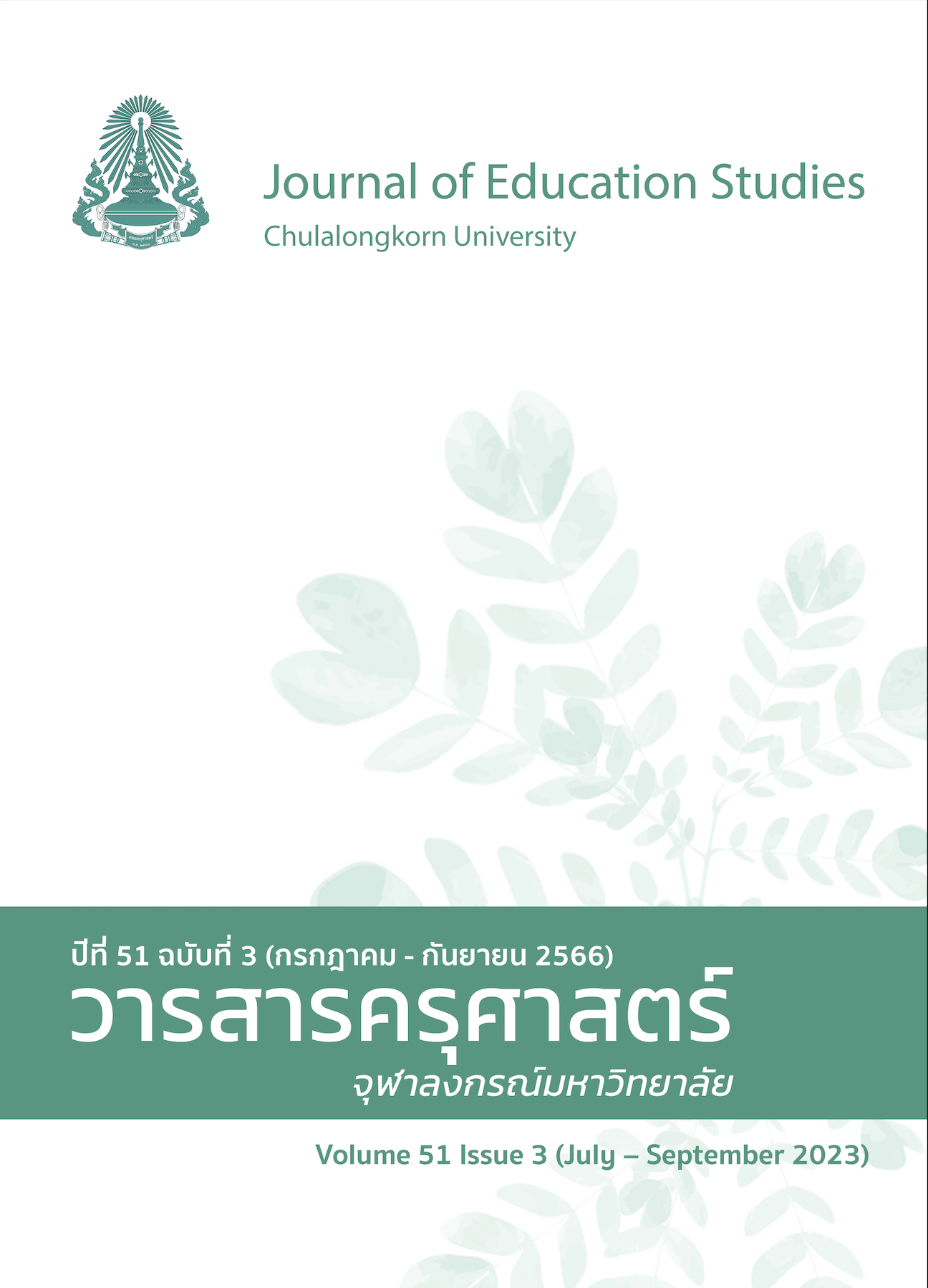Guidelines for Enhancing the Success of Online Learning for Undergraduate Students at the Faculty of Education, Ramkhamhaeng University
DOI:
https://doi.org/10.14456/educu.2023.22Keywords:
Ramkhamhaeng University, success of online learning, guidelinesAbstract
Instructors in higher education increasingly use technologies for instruction; therefore, undergraduate students are able to access and engage in online learning more conveniently. This study was divided into two phases; the first phase consisted of an analysis of the online learning characteristics of undergraduate students and validation of the causal model for the online learning success of undergraduate students. A total of 607 undergraduate students who studied in the Faculty of Education at Ramkhamhaeng University were selected through stratified random sampling according to year level. The research instrument employed was a questionnaire, and data were analyzed using descriptive statistics, one-way ANOVA, and structural equation model analysis. The second phase involved developing guidelines for enhancing the online learning success of undergraduate students. Teachers and undergraduate students selected through purposive selection were interviewed, and data were analyzed through content analysis. The results were as follows:
- Students who reviewed online course materials for 5-10 hours and 11-15 hours per week had significantly higher grades than those who spent less than 5 hours per week.
- The causal model of online learning success fit with the empirical data ((40, N=607) = 53.78, p = .07, CFI = 0.99, RMSEA = 0.02, SRMR= 0.01).
- The guidelines for enhancing the online learning success of undergraduate students in the Faculty of Education at Ramkhamhaeng University were presented in three parts: the course design of the instructors, the characteristics of the undergraduate students, and university support.
References
ชนินทร์ ตั้งพานทอง. (2560). ปัจจัยที่มีต่อผลสัมฤทธิ์ทางการเรียนออนไลน์เพื่อเสริมการเรียนการสอน[วิทยานิพนธ์ปริญญามหาบัณฑิต]. Chulalongkorn University Intellectual Repository(CUIR).
http://cuir.car.chula.ac.th/handle/123456789/59699
พัชรา คงเหมาะ. (2560). แนวทางการพัฒนาห้องเรียนออนไลน์สำหรับอาจารย์มหาวิทยาลัยเทคโนโลยีราชมงคลธัญบุรี. มหาวิทยาลัยเทคโนโลยีราชมงคลธัญบุรี. http://www.repository.rmutt.ac.th/dspace/bitstream/123456789/2871/1/The%20guiding%20paradigm%20in%20online%20classroom%20development%20for%20RMUTT%20lecturer-R2R.pdf
สำนักบริการทางวิชาการและทดสอบประเมินผล มหาวิทยาลัยรามคำแหง. (2565, 1 มีนาคม). สถิติที่เกี่ยวกับนักศึกษาระดับปริญญาตรี โดยงานนโยบายและแผน. http://www.regis.ru.ac.th/index.php/10-stat/20-planpolicy_stat
Abuhassna, H., Al-Rahmi, W. M., Yahya, N., Zakaria, M. A. Z. M., Kosnin, A. B. M., & Darwish, M. (2020). Development of a new model on utilizing online learning platforms to improve students’ academic achievements and satisfaction. International Journal of Educational Technology in Higher Education, 17, 1-23.
Ali, W. (2020). Online and remote learning in higher education institutes: A necessity in light of COVID-19 pandemic. Higher education studies, 10(3), 16-25.
Barclay, C., Donalds, C., & Osei-Bryson, K. M. (2018). Investigating critical success factors in online learning environments in higher education systems in the Caribbean. Information Technology for Development, 24(3), 582-611.
Barnard, L., Paton, V., & Lan, W. (2008). Online self-regulatory learning behaviors as a mediator in the relationship between online course perceptions with achievement. International Review of Research in Open and Distributed Learning, 9(2), 1-11.
Broadbent, J., & Poon, W. L. (2015). Self-regulated learning strategies & academic achievement in online higher education learning environments: A systematic review. The Internet and Higher Education, 27, 1-13.
Dinh, L. P., & Nguyen, T. T. (2023). Convenient and comfortable, yet limited in many ways: advantages and disadvantages of online learning during the covid-19 pandemic from perspectives of social work students in Vietnam. Asia Pacific Journal of Social Work and Development, 33(3), 193-201.
Eom, S. B., & Ashill, N. J. (2018). A system's view of e‐learning success model. Decision Sciences Journal of Innovative Education, 16(1), 42-76.
Gilboy, M. B., Heinerichs, S., & Pazzaglia, G. (2015). Enhancing student engagement using the flipped classroom. Journal of Nutrition Education and Behavior, 47(1), 109-114.
Kahu, E. R., & Nelson, K. (2018). Student engagement in the educational interface: understanding the mechanisms of student success. Higher Education Research & Development, 37(1), 58-71.
Konold, T., Cornell, D., Jia, Y., & Malone, M. (2018). School climate, student engagement, and academic achievement: A latent variable, multilevel multi-informant examination. Aera Open, 4(4), 1-17.
Lei, H., Cui, Y., & Zhou, W. (2018). Relationships between student engagement and academic achievement: A meta-analysis. Social Behavior and Personality: an international journal, 46(3), 517-528.
Muljana, P. S., & Luo, T. (2019). Factors contributing to student retention in online learning
and recommended strategies for improvement: A systematic literature
review. Journal of Information Technology Education: Research, 18.
Safsouf, Y., Mansouri, K., & Poirier, F. (2020). An analysis to understand the online learners’ success in public higher education in Morocco. Journal of Information Technology Education. Research, 19, 87.
Singh, V., & Thurman, A. (2019). How many ways can we define online learning? A systematic literature review of definitions of online learning (1988-2018). American Journal of Distance Education, 33(4), 289-306.
Su, C. Y., & Guo, Y. (2021). Factors impacting university students' online learning experiences during the COVID‐19 epidemic. Journal of computer assisted learning, 37(6), 1578-1590.
van Alten, D. C., Phielix, C., Janssen, J., & Kester, L. (2020). Self-regulated learning support in flipped learning videos enhances learning outcomes. Computers & Education, 158, 104000.
Wandler, J. B., & Imbriale, W. J. (2017). Promoting undergraduate student self-regulation in online learning environments. Online Learning, 21(2), n2.
Xu, B., Chen, N. S., & Chen, G. (2020). Effects of teacher role on student engagement in WeChat-Based online discussion learning. Computers & Education, 157, 103956.
Zen, Z., & Ariani, F. (2022). Academic achievement: the effect of project-based online learning method and student engagement. Heliyon, 8(11), e11509.
Zhan, Z., & Mei, H. (2013). Academic self-concept and social presence in face-to-face and online learning: Perceptions and effects on students' learning achievement and satisfaction across environments. Computers & Education, 69, 131-138.
Zheng, B., Lin, C. H., & Kwon, J. B. (2020). The impact of learner-, instructor-, and course-level factors on online learning. Computers & Education, 150, 103851.
Zhu, X., & Liu, J. (2020). Education in and after Covid-19: Immediate responses and long-term visions. Postdigital Science and Education, 2(3), 695-699.
Downloads
Published
How to Cite
Issue
Section
License

This work is licensed under a Creative Commons Attribution-NonCommercial-NoDerivatives 4.0 International License.




